
Explore drywall costs based on project size, wall thickness, material quantity required, and labor rates for installation.
Drywall repair costs $610 on average, but costs vary with the type of repair, the size of the area, and the type of damage.


Most homeowners pay between $295 and $925 for drywall repair costs, with an average of $610.
Factors like the type of repair, size of the damage, and materials impact final costs.
Catching and fixing small damage early prevents it from growing into a more costly issue later.
Hiring a drywall professional ensures a smooth finish and long-lasting quality.
This article was updated using automation technology and thoroughly reviewed for accuracy by HomeAdvisor Editor Ryan Noonan.
Whether you’re patching a few dings or replacing an entire panel, the average cost of drywall repair is $610, with a range between $295 and $925. Most drywall pros charge about $50 to $75 per square foot. Your final price hinges on the repair method, the wall size, and the materials you choose, so set a realistic budget and plan to bring in a qualified pro for a finish that lasts.
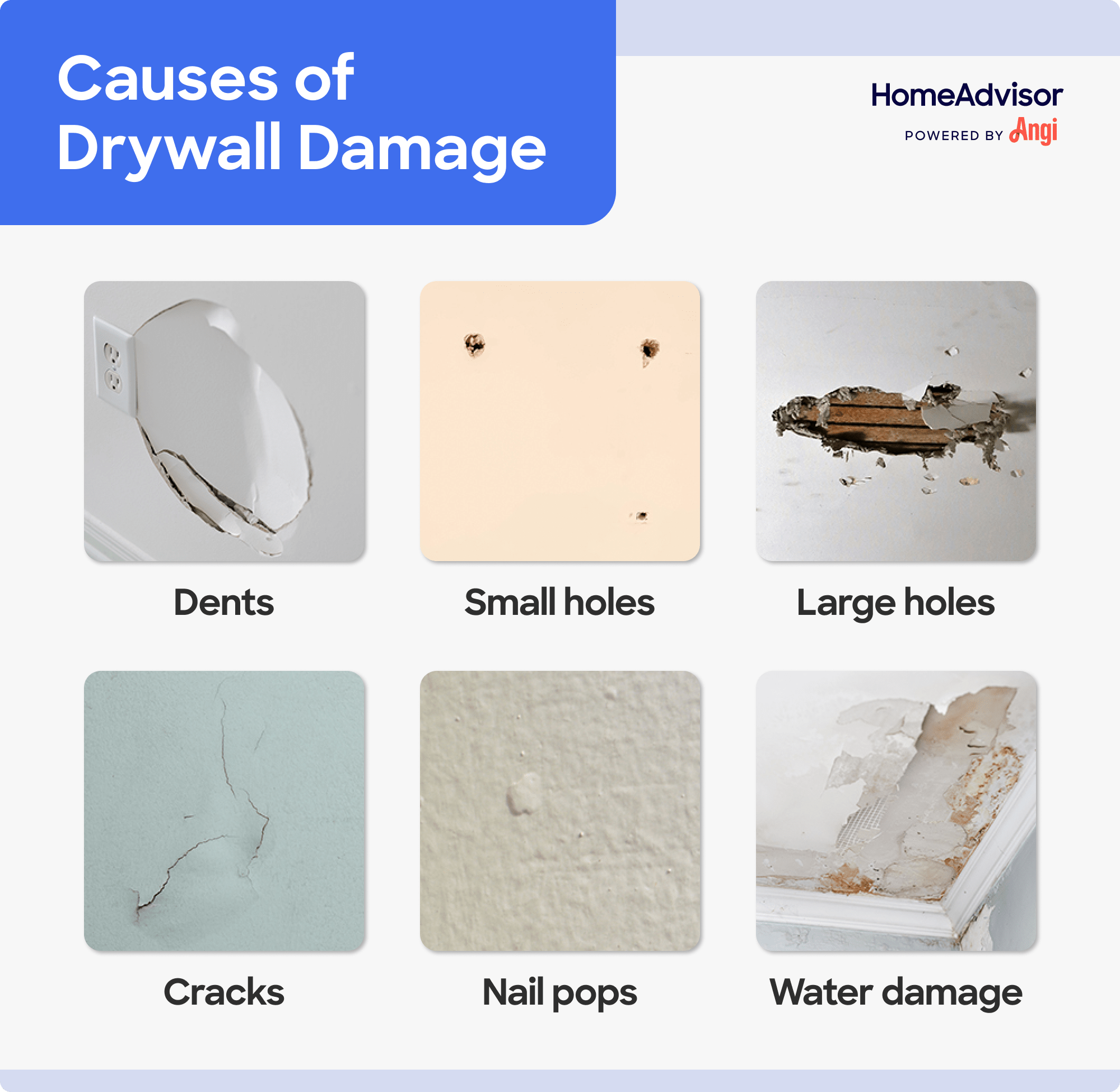
Your drywall repair bill depends on how big the damage is, the type of repair necessary, and whether the pro has to tackle any hidden problems behind the wall.
Many contractors quote a flat fee for one-off fixes, but that number varies with the type of repair. A small crack might run about $100, while extensive water damage can top $1,550.
| Drywall Repair Type | Average Cost |
|---|---|
| Cracks and chips | $60–$400 |
| Nail pop | $10–$60 |
| Drywall anchor repair | $75–$100 |
| Tears | $20–$120 |
| Water damage | $600–$1,550 |
| Mold damage | $150–$350 |
| Ceilings | $220–$1,300 |
Expect to spend anywhere from $60 to $400 to fix cracks or chips. These blemishes pop up for all kinds of reasons, including temperature swings, humidity, or an imperfect install. Hairline and medium-sized cracks represent the lower end of the cost range, typically only needing basic filling and sanding.
Extensive crack repair may involve new sections, wood supports, adhesive, and multiple compound coats. Foundation shifting and swelling in the framing can require additional repair to prevent drywall problems from recurring.
Repairing nail pops costs between $10 and $60. These repairs are more common in older homes since new construction uses screws. Contractors remove and replace the nails or screws and patch the area with compound.
Drywall anchors support heavy items hanging on your walls when studs aren’t available. When they’re removed or if they fail, they leave holes behind. Patching these holes costs $75 to $100, with higher-end costs representing areas with multiple anchor installations or failures.
Drywall tears cost between $20 and $120 to repair. Tears in drywall paper occur from impactfrom items like doors and moving furniture, and they need more involved taping and compound coats.
Water damage is among the most expensive types of drywall repair—ranging from $600 to $1,550—since it requires replacing entire sections. Addressing underlying moisture problems, such as plumbing or roof leaks, adds to total costs.
Expect to pay between $150 and $350 to repair drywall with mold damage, which often comes with water damage or humidity problems. These repairs may be more costly if they require underlying fixes and preventative measures, like specialized mold-resistant drywall or plumbing repairs. If the mold has spread beyond the drywall, you may also have to hire a specialist for mold remediation, which costs between $375 and $7,000.
The average cost to repair a drywall ceiling is between $220 and $1,300. Fixing ceilings can be challenging due to the height, especially for speciality ceilings like vaulted and cathedral ceilings. Your pro will use special tools, and extra services like popcorn ceiling removal will add to the total cost.
Drywall pros price small patches at about $50 to $75 by square foot. Even when they quote an hourly or flat rate, the math often works out to roughly the same range.
| Square Footage | Average Cost for Materials and Labor |
|---|---|
| 1 | $50–$75 |
| 2 | $100–$150 |
| 4 | $200–$300 |
| 5 | $250–$375 |
| 8 | $400–$600 |
| 10 | $500–$750 |
| 20 | $1,000–$1,500 |
You can also get an idea of the project cost by estimating the scope of the damaged area. A small hole is more manageable and less costly to fix, whereas a large hole, a whole wall, or multiple rooms will cost more for labor and materials.
| Scope of the Repair | Average Cost |
|---|---|
| Small hole | $20–$120 |
| Large hole | $50–$200 |
| Whole wall | $500–$1,600 |
| Multiple rooms | $75–$1,500 |
Contractors charge about $20 to $120 for small fixes. Small holes, often caused by doorknobs, screws, and rodents, may range in size from a fraction of an inch to up to 4 inches across. You can patch small holes with a DIY repair kit for $10 to $30.
Large drywall repairs cost between $50 and $200. Various everyday activities can cause large holes or cracks, like moving heavy furniture, playing or roughhousing indoors, or falling shelves.
Once the hole gets bigger, materials start to drive the price more than they do with small patches. Most drywall pros roll these items into their estimate:
$10–$25 per sheet of standard drywall
$5–$10 per box of drywall screws or nails
$4.50 per roll of drywall tape
$5–$15 for spackle or joint compound
In some cases, replacing the sheet or wall is necessary if its integrity is compromised. Replacing a whole wall of drywall costs between $500 and $1,600, which breaks down to about $2 to $5.50 per square foot for removal and replacement.
If several rooms share the same damage, ask the contractor to tackle everything in one visit. Bundling small repairs beats paying separate trip fees.
| Number of Rooms | Drywall Repair Cost |
|---|---|
| 1 | $75–$300 |
| 2 | $150–$600 |
| 3 | $225–$900 |
| 4 | $300–$1,200 |
| 5 | $375–$1,500 |
Labor accounts for about 70% of overall drywall repair costs. Drywall repair contractors charge flat or hourly fees for small fixes, between $60 and $90 per hour. Larger projects may have a size-based pricing structure, averaging $60 to $80 per square foot. Standard drywall repairs include damaged drywall removal and replacement if necessary, as well as compound application and sanding.
Actual labor rates depend on expertise and experience—for example, a drywall installation specialist may have higher rates than a handyperson but offer specialized skills and superior project results. Extensive replacements may also come with added charges for drywall hauling and disposal.
Some drywall repairs require further specialized work, like those involving electrical wiring problems, damaged insulation, or leaking plumbing. Here are rates you can expect from contractors potentially involved with your repair:
| Contractor | Average Cost per Hour | Drywall Repair Type |
|---|---|---|
| Handyperson | $60–$90 | Small cracks, holes, and dents |
| Drywall and ceiling repair specialist | $60–$120 | Medium to major holes, water damage, and ceiling work |
| Electrician | $50–$100 | Electrical repairs and upgrades |
| Plumber | $45–$200 | Plumbing repairs and upgrades |
| Painter | $70–$130 | Painting and finishing |
| Insulation installer | $40–$80 | Insulation replacement |
Location is also a factor, often influencing the cost of living and overall repair rates. If you live in a rural area and outside the standard service range, contractors may include additional travel fees in their estimates.
Drywall repairs come with a basic skim coat without additional painting or texturing. Expect to spend $70 to $130 per hour or $2 to $6 per square foot for professional painting. Drywall repairs are a good opportunity to address overdue paint jobs in that room or section. On average, repainting a room costs $990 to $1,320.
If your walls have specialized textures, plan to pay $100 to $900 or $1 to $1.95 per square foot for retexturing.
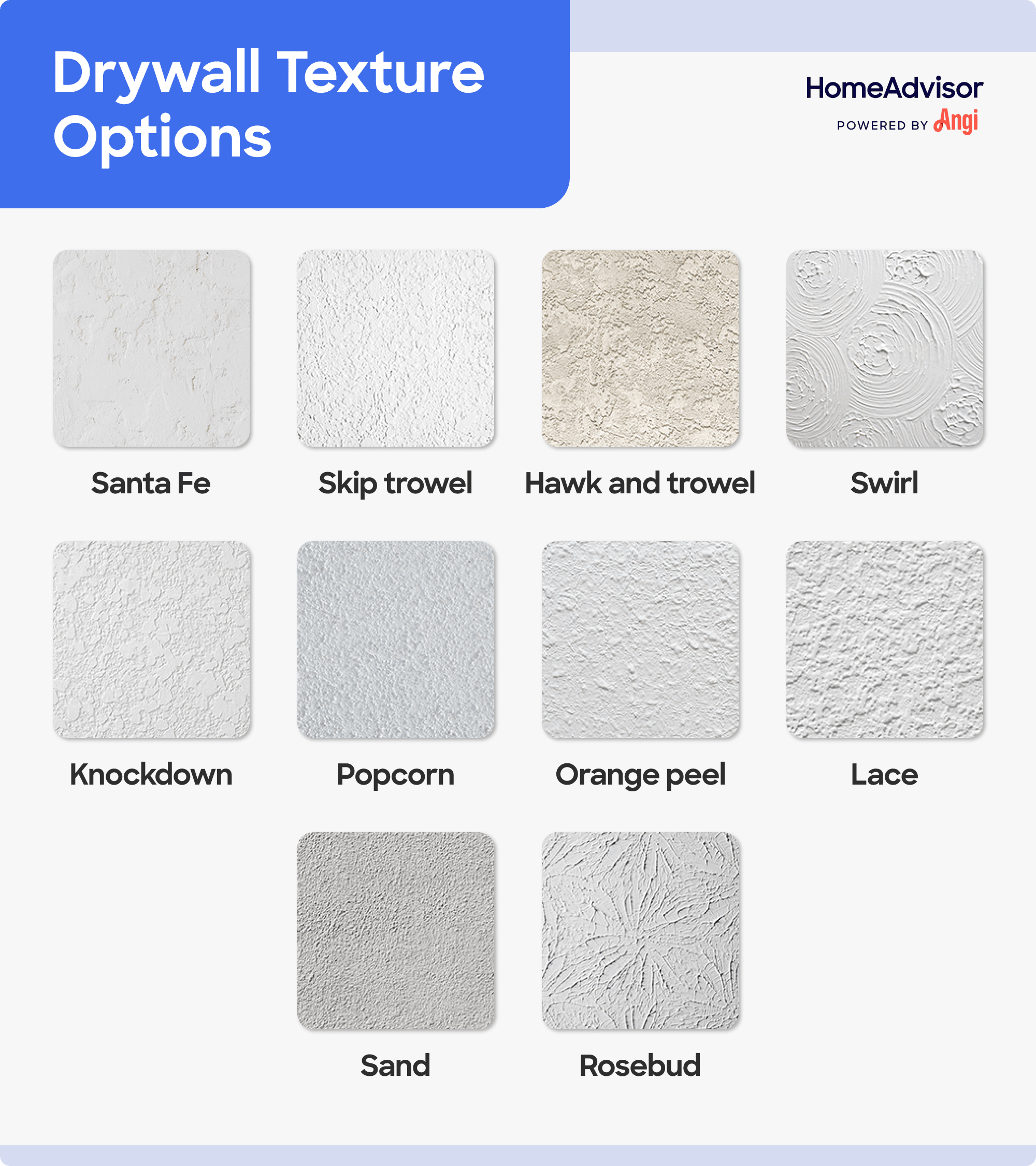
While drywall repairs are more budget-friendly than replacement, there are cases when the latter is the reasonable solution, depending on the cause and extent of the damage. If only small sections need fixing, such as hairline cracks, surface damage, or isolated water damage, repair is more cost-effective.
However, recurring repairs due to unaddressed and underlying problems, like water damage or pest infestation, can result in higher costs than replacing the drywall section altogether. Consider opting for permanent replacement for these circumstances:
Extensive holes and cracks (6 inches or more)
Severe water damage
Warping, sagging, or bulging drywall
Significant mold growth
Compromised structural integrity
Old and deteriorating drywall
A pro can inspect the damage and provide guidance on the next best course of action.
When your drywall needs professional repair, several strategies can help you manage your costs and stay within your budget. Try these tips:
Get multiple estimates: Get detailed estimates from multiple contractors to find the most competitive and valuable option.
Negotiate pricing: Inquire about special offers or discounts, such as those for off-peak pricing or flexible scheduling.
Bundle repairs: Some contractors offer discounted packages for drywall repairs and related services, including painting or texturing.
Address underlying issues: Prioritize taking care of underlying problems causing drywall damage. Leaving these issues unaddressed can lead to recurring damage and more extensive repair costs.
No place is more important than your home, which is why HomeAdvisor connects homeowners with local pros to transform their houses into homes they love. To help homeowners prepare for their next project, HomeAdvisor provides readers with accurate cost data and follows strict editorial guidelines. We surveyed over 30,000 real customers about their project costs to develop the pricing data you see, so you can make the best decisions for you and your home. We pair this data with research from reputable sources, including the U.S. Bureau of Labor Statistics, academic journals, market studies, and interviews with industry experts—all to ensure our prices reflect real-world projects.
From average costs to expert advice, get all the answers you need to get your job done.

Explore drywall costs based on project size, wall thickness, material quantity required, and labor rates for installation.
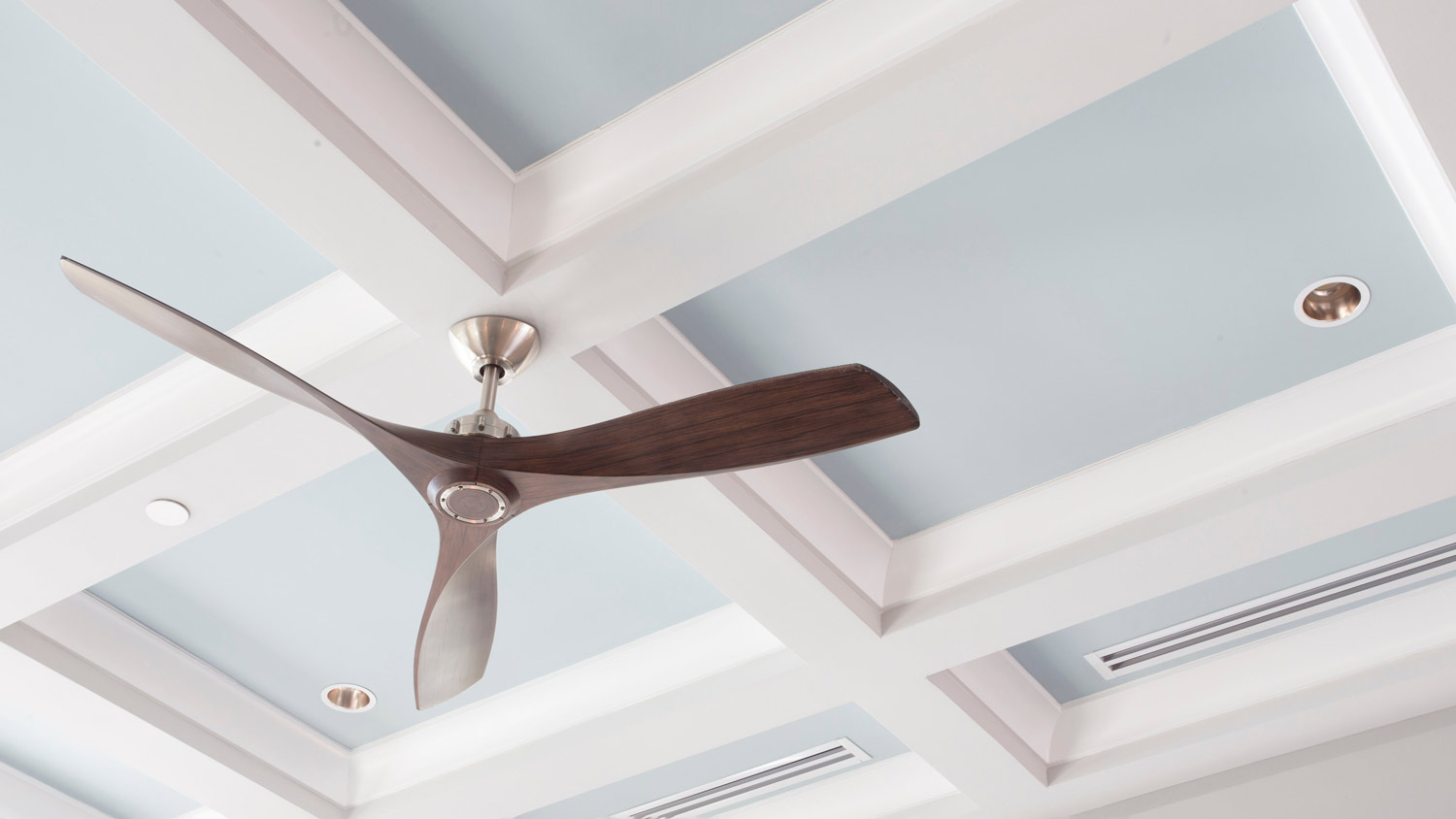
Wondering who to hire to fix a sagging ceiling? See who to call—contractor, handyman, or drywall pro—and what costs to expect
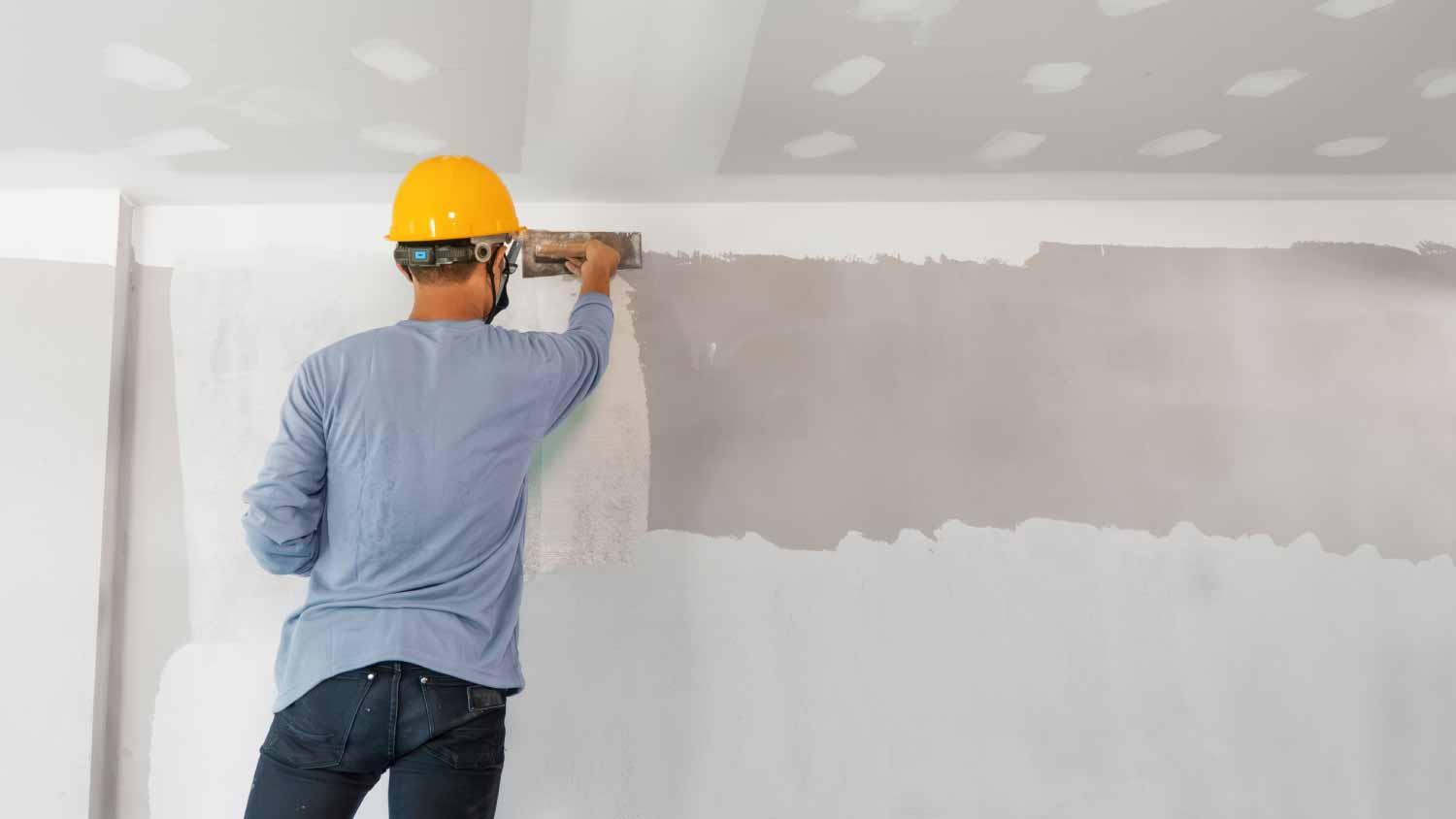
Wondering who does plaster work? Learn why you should hire a plasterer, what they do, and what plaster work costs, so you can hire confidently.
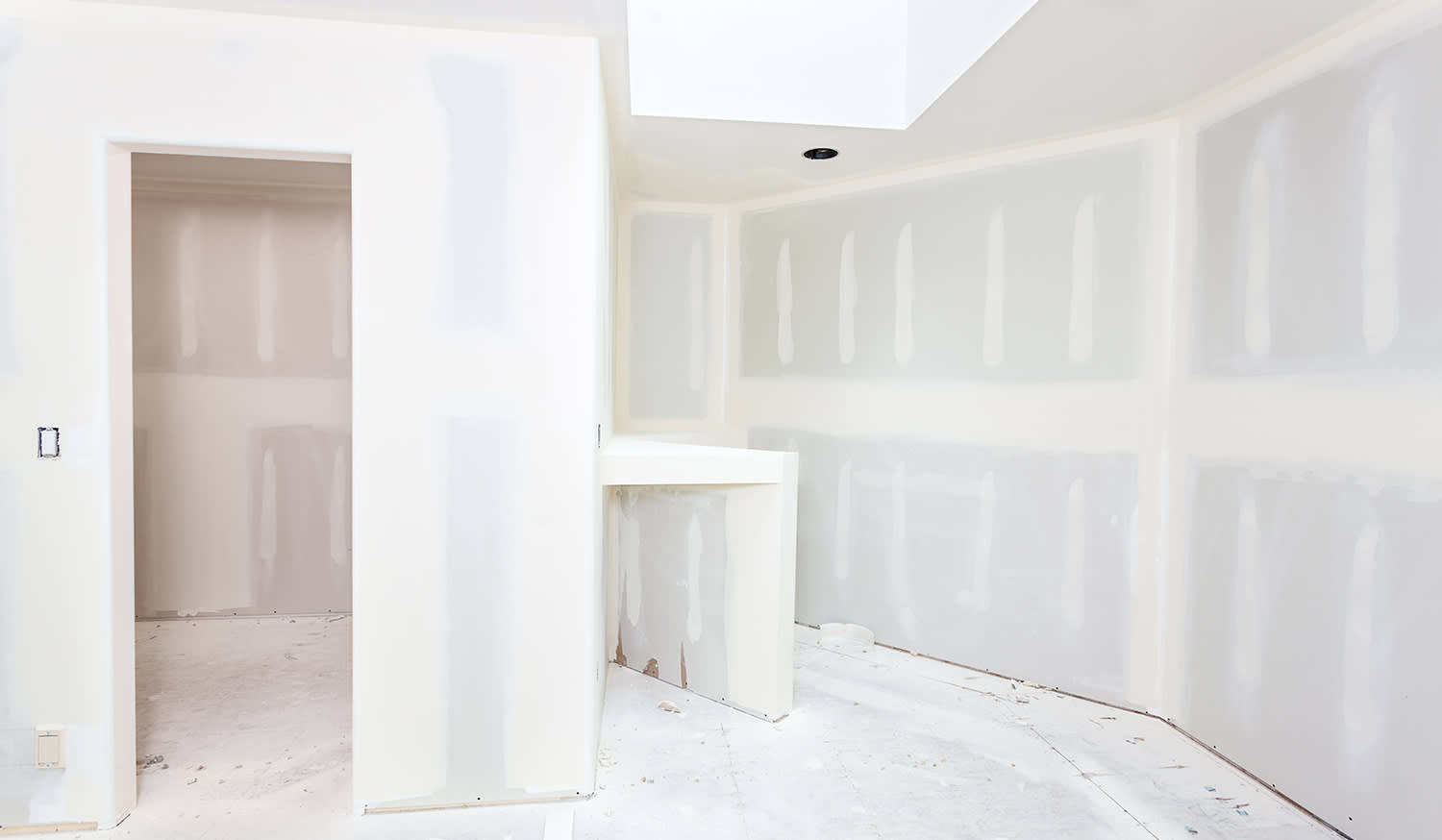
How much drywall do you really need for your project? Find out with this handy drywall calculator tool.
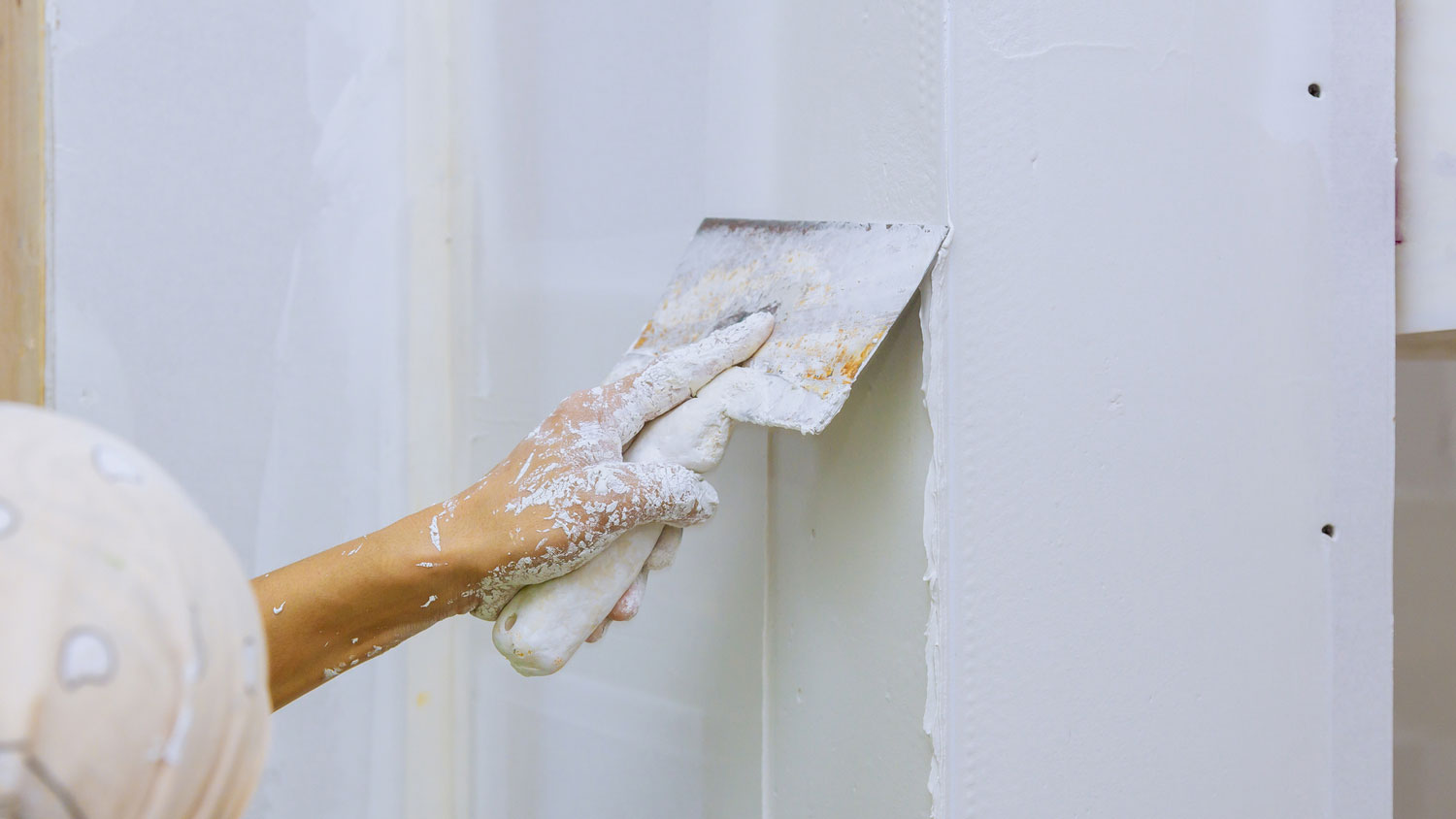
Wondering who patches drywall after plumbing or electrical work? Learn when to call a drywall contractor, what to ask, and what costs to expect.